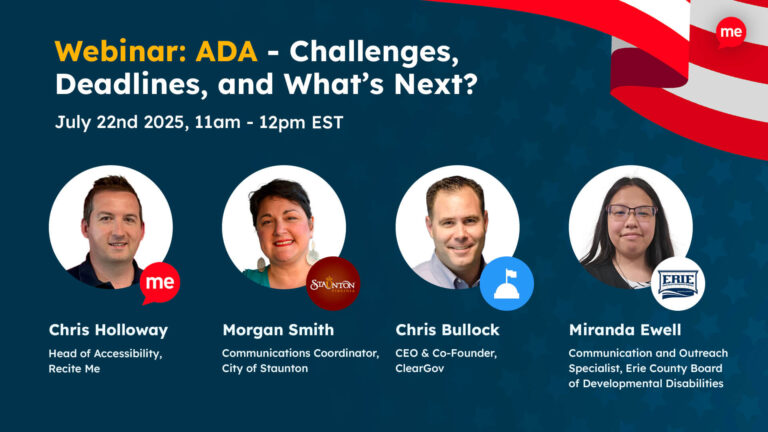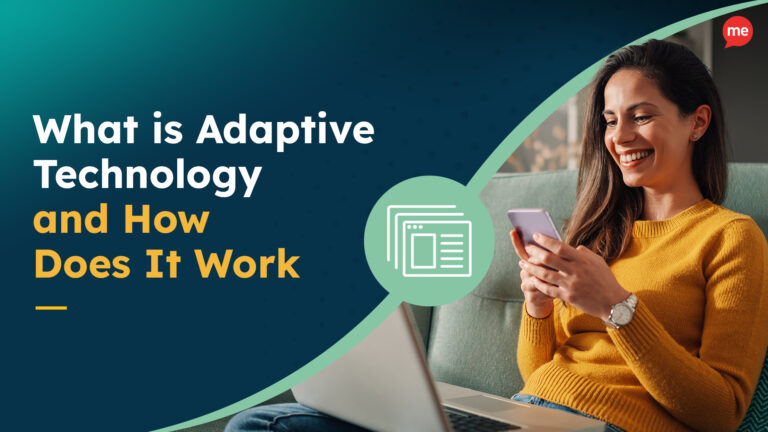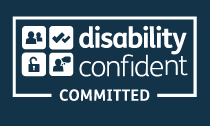Get A Free ADA Compliance Audit Of Your Website
Download NowAs technology evolves, the need for comprehensive digital accessibility standards becomes more pronounced. In Illinois, web accessibility standards are higher than in many other states.
Illinois’ journey towards accessibility legislation was shaped by the recognition of the vital role technology plays in modern life. With access to information, communications, and services often reliant on digital technology, the State found it was not consistently or cost-effectively ensuring accessibility to individuals with disabilities, thus preventing equal participation in crucial areas of life like education and employment.
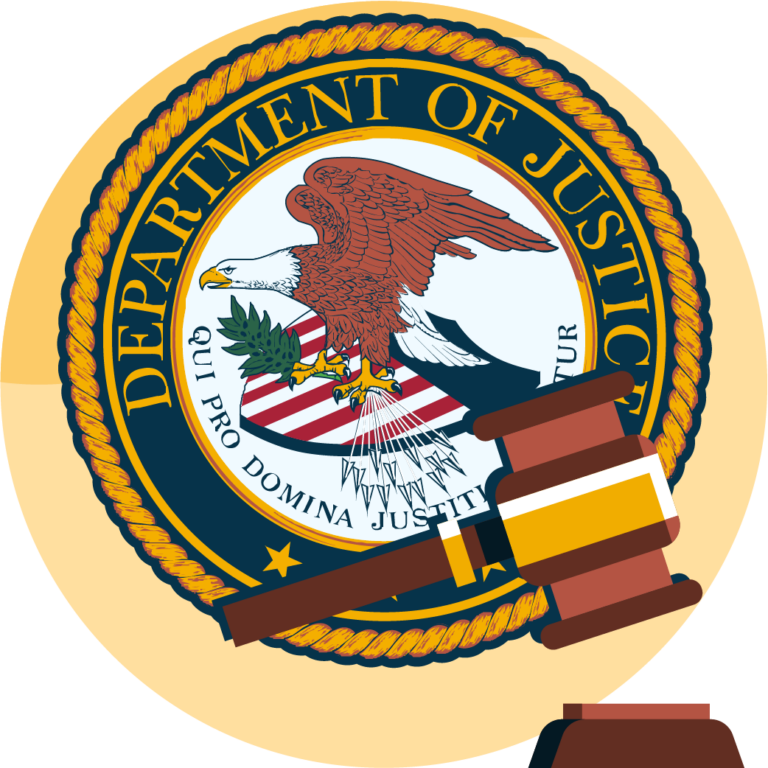
Web Accessibility Laws in Illinois
Motivated by a commitment to inclusivity and equal opportunity, the state has crafted additional legislation that goes above and beyond federal requirements to ensure digital platforms are accessible to all individuals, regardless of ability. Here’s a breakdown of all web accessibility legislation that applies in Illinois.
Illinois Information Technology Accessibility Act (IITAA)
The Illinois Information Technology Accessibility Act (Public Act 095-0307) was originally signed in 2007, with technical standards going into effect in 2008. Updated IITAA 2.0 Standards were published and went into effect in 2018.
IITA requires all information technology that is developed, purchased, or provided by State agencies and public universities to be accessible to individuals with disabilities. This includes:
- Websites
- Electronic documents and videos
- Software and mobile applications
- Computers and peripherals
- Information kiosks
- Multifunction office machines
- Telecommunications equipment
IITA’s technical standards are based on compliance with Web Content Accessibility Guidelines (WCAG) 2.0 Level AA, but compliance with WCAG 2.1 and Level AAA guidelines is encouraged where possible.
The Americans With Disabilities Act
The Americans with Disabilities Act (ADA) was enacted in 1990 to address physical accessibility challenges. However, under updated provisions, websites and digital platforms are viewed as extensions of physical spaces, making digital ADA compliance a requirement for government agencies and public-facing businesses like banks, healthcare providers, retail companies, transportation providers, and leisure and entertainment venues.

The ADA is split into five titles, although only the first three apply to website accessibility:
- ADA Title I prohibits employment discrimination and mandates that all information regarding recruitment, hiring, promotions, training, job assignments, and termination be accessible.
- ADA Title II addresses the accessibility of public services, programs, and activities. It mandates that state and local governments make digital information equally available to disabled citizens.
- ADA Title III applies to any public-facing business. It mandates that companies provide full and equal online access to goods, services, facilities, privileges, advantages, and accommodations.
You can learn more about ADA compliance in Illinois here.
Section 508 of the Rehabilitation Act
Section 508 of the 1973 Rehabilitation Act applies primarily to federal agencies. It requires that all electronic and information technology used by government agencies be accessible to individuals with disabilities, including websites, software, and other digital assets. The overarching goal is to ensure that:
- Federal employees with disabilities have equal access to information and data as their non-disabled counterparts.
- Members of the public seeking federal information or services have comparable access to information and data as non-disabled citizens.
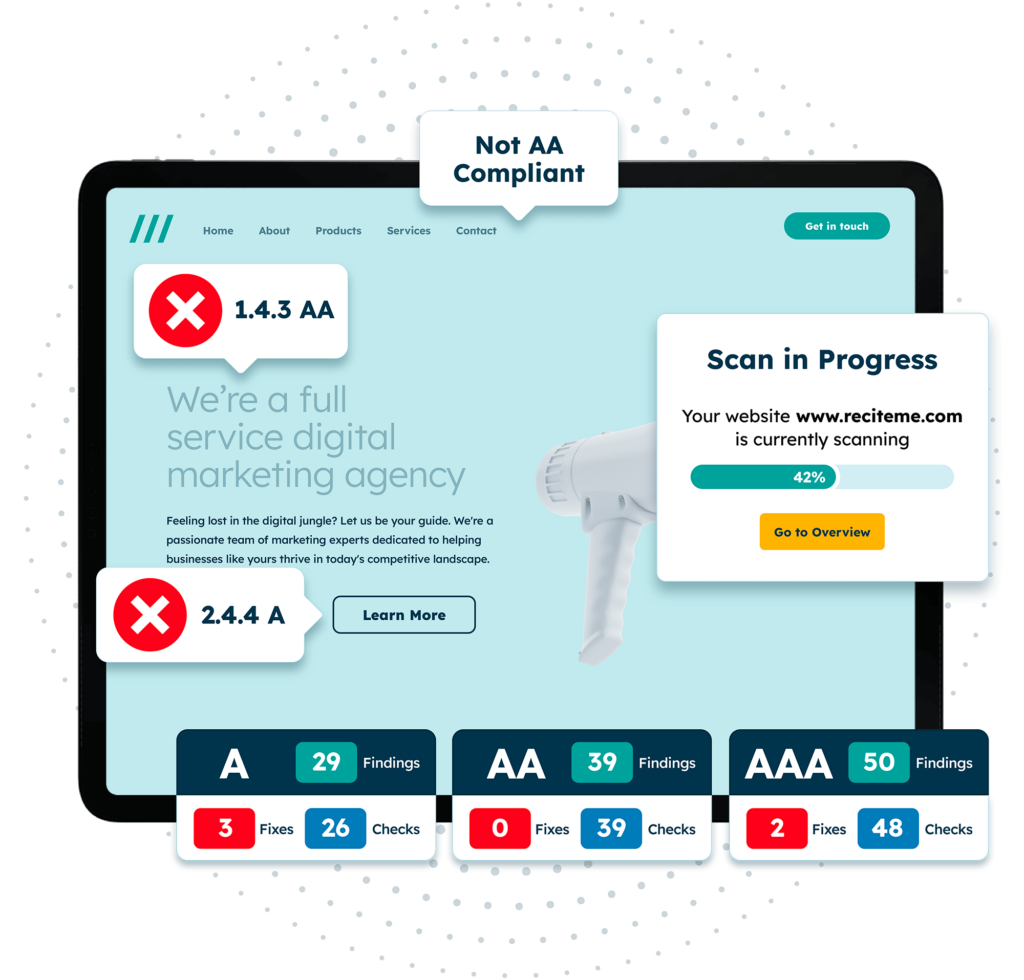
Free Accessibility Check of your Website
Finding accessibility issues is now easier than ever. Recite Me offers a free automated scan of your website’s homepage to highlight non-compliance. You’ll get recommendations on how to fix them, helping to improve your accessibility score.
What Types of Business Are Affected By Illinois Web Accessibility Legislation?
Accessibility laws in Illinois extend to various entities, including government organizations, contractors, private companies, and educational institutions.
At first glance, it may appear that ADA Title III is the only piece of web accessibility legislation that applies to private businesses, and that the focus of Illinois web accessibility legislation is primarily on government and federal organizations. However, that’s not necessarily the case.
In addition to ADA Title III, private companies can also be affected by Section 508, as regulations also apply to private businesses supplying goods or services or receiving funding from a government entity or federal agency. Examples include:
- Direct or indirect subcontractors across fields like technology, software provision, telecommunications, construction, engineering, etc.
- Non-profit grant recipients like charities, conservation groups, research institutions, and community development organizations.
- For-profit recipients of federal funding across the healthcare, finance, education, and transport sectors.
What are The Risks and Consequences of Non-Compliance?
Companies found to be non-compliant with IITAA, ADA, or Section 508 standards are at risk of both lawsuits and fines. If your organization receives government funding, non-compliance may also result in it being revoked.
Aside from potential financial and legal penalties, there are several other negative consequences for businesses with non-compliant websites. Examples include:
- Limited market reach – Inaccessible platforms limit access and engagement.
- Loss of revenue – Boycotting by people with disabilities, their families, and associates may lead to a significantly reduced market share.
- Reputational damage – Negative PR may result in decreased brand loyalty.
- Reduced employee morale – Employees may feel disillusioned or embarrassed to be associated with your company, leading to decreased job satisfaction and retention.
- Enhanced regulatory scrutiny – Non-compliance may attract heightened attention from government agencies and watchdog organizations.
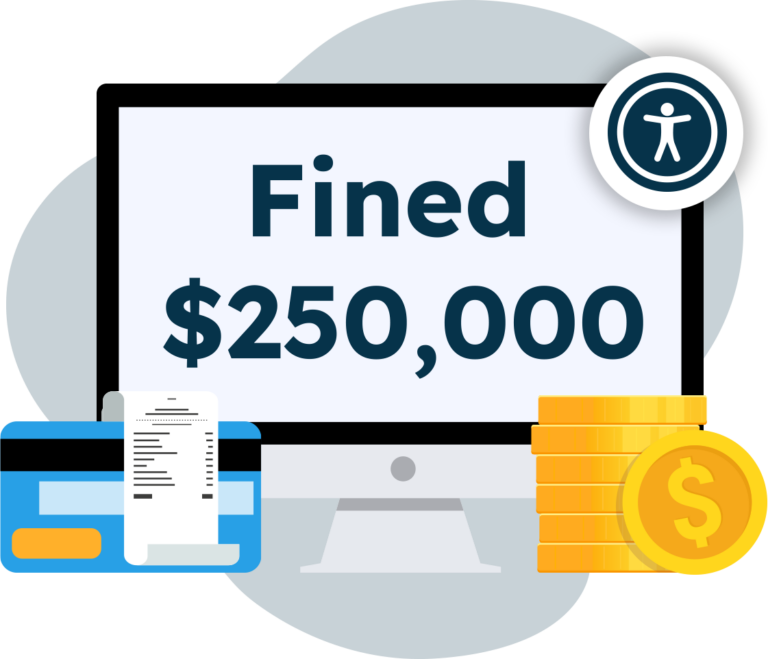
Notable Digital Accessibility Lawsuits in Illinois
Illinois ranks 5th in America for the number of web accessibility lawsuits filed annually. Legal cases provide valuable insights into the evolving legal landscape surrounding digital accessibility and serve as a stark reminder of the potential consequences of non-compliance.
In the case of Illinois, specifically, web accessibility lawsuits also serve as a valuable reminder that excluding just one person can have severe repercussions, as three big-name retailers found out when they were sued by the same disabled citizen, Kayla Reed:
- Reed v. Kmart
- Reed v. Empire Today
- Reed v. Ace Hardware
Reed, who lives in the Los Angeles area, is visually impaired. However, because the retailers in question are based in Chicago (Hoffman Estates, Northlake, and Oakbrook), the suits were filed through the Illinois courts. Each case cited ADA Title III, alleging the companies maintain websites that are unusable for customers with vision impairments. In the case of Kmart, Reed also alleged that the company’s mobile app was not accessible to blind customers.
Reed was represented by attorneys from Chicago-based firm PaytonDann firm, which also headed up several similar website accessibility suits on behalf of other blind plaintiffs. Defendants in these cases include:
- Kraft Heinz Foods
- Retail giant Sears
- McDonald’s
- GrubHub
The litigation against Kraft Heinz Foods was settled in 2017 for an undisclosed amount. Most of the other cases remain pending.
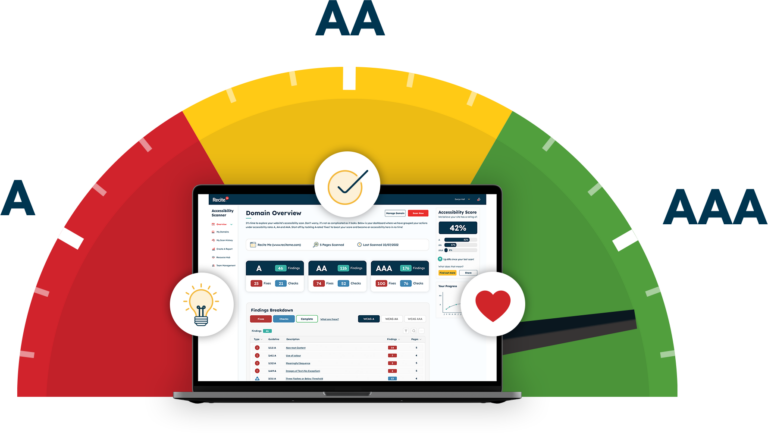
The Importance of WCAG Compliance
Developing a thorough understanding of the Web Content Accessibility Guidelines is essential, primarily because they are the international gold standard in web accessibility. However, publishing content that is perceivable, operable, understandable, and robust as per the four core principles of WCAG is typically the basis of any given piece of US digital accessibility statute. Businesses with WCAG compliant websites are therefore much more likely to be compliant with web accessibility legislation across the board.
Stay ahead of the game when it comes to Digital Accessibility laws and compliance in the United States. Learn about all the different federal and state-level regulations, see real examples of web accessibility lawsuits in different regions and discover a 7-step action plan for building accessible websites.
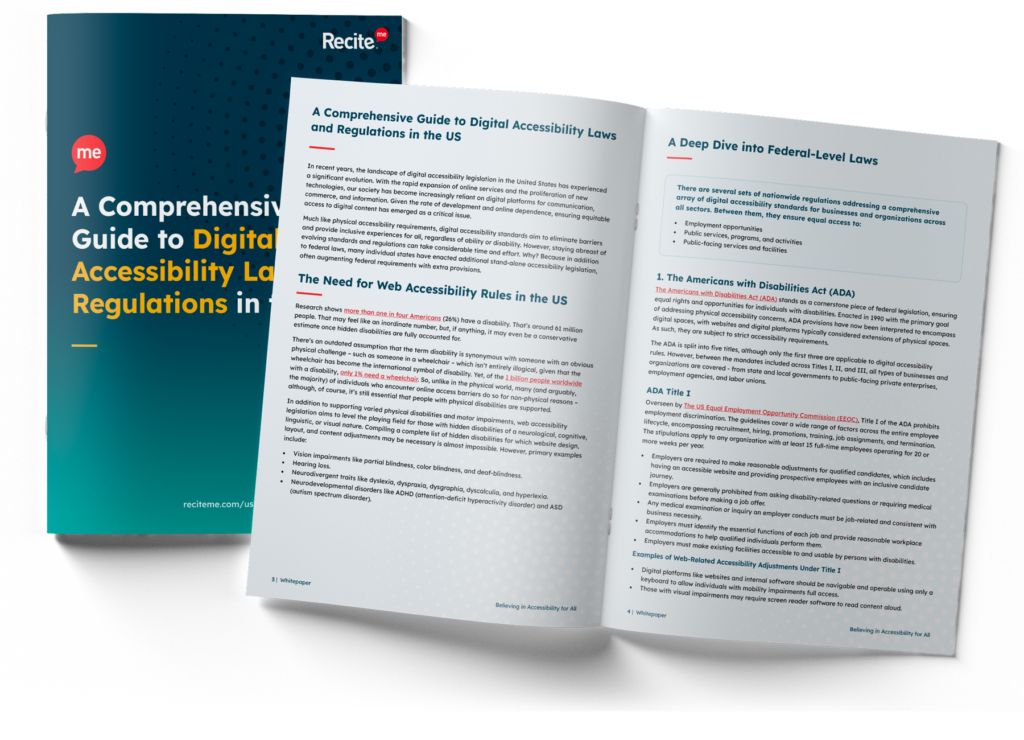
How to Build and Maintain a Compliant Website
Investing in accessibility software and technology services helps you deliver inclusive online experiences while also accomplishing legal compliance. But, with website content changing constantly, knowing where to start is often challenging.
With that in mind, Recite Me has developed a suite of web accessibility tools to help organizations enhance their website build, boost usability, and demonstrate commitment to accessibility.
How to Develop a Compliant Website Build
The Recite Me Accessibility Checker audits both back-end and front-end web development processes. Comprising 396 separate compliance scans, our software effortlessly identifies non-compliance issues and generates a prioritized fix queue based on WCAG criteria. Here’s how it works:
- Step 1: Scan – Choose from scanning a single page for a quick snapshot or multiple pages for a more comprehensive view.
- Step 2: Identify—The dashboard displays an overview of errors, their locations, and guidance on what to tackle first.
- Step 3: Fix – Actions are grouped into priority fix queues building up from WCAG A to AA and AAA criteria.
- Step 4: Track – Custom reports detail progress and roadmap compliance fixes yet to be actioned.
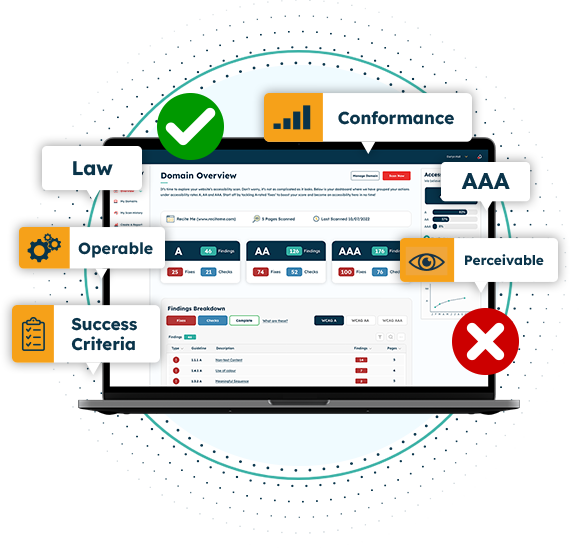
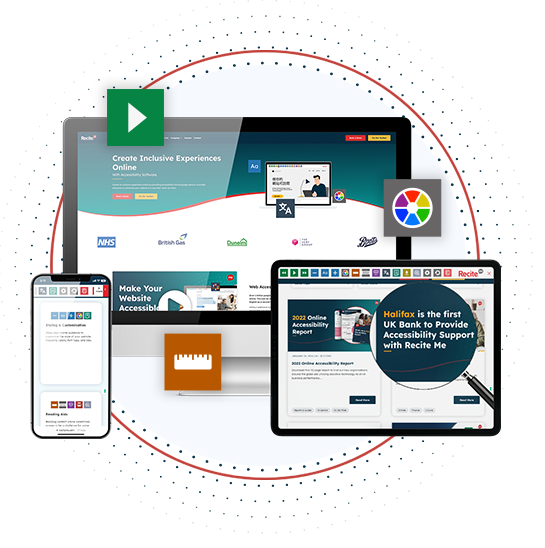
How to Boost Website Usability
Making your website IITA, ADA, and Section 508 compliant won’t automatically make it inclusive because every online visitor has different needs and preferences, often requiring multiple accommodations and adjustments.
The Recite Me Toolbar promotes inclusivity by allowing end users with sight loss, cognitive impairments, learning difficulties, physical disabilities, and varying linguistic needs to make singular or multiple adjustments for ease of navigation and content consumption. The Toolbar allows users to customize:
- Font size, type, and color options.
- Color contrast between the text and background.
- The display language (over 100 on-screen languages are available)
- PDF documents
- The method of consumption (download content as audio files or translate into 65 text-to-speech languages).
In addition, tools like the on-screen ruler, mask, zoom function, built-in spell-checker, and fully integrated dictionary and thesaurus help with focus and enhance comprehension.
How to Demonstrate Ongoing Commitment to Digital Accessibility
If you use the Recite Me Accessibility Checker, you’ll have access to a dedicated account manager who can help guide you on marketing and promoting your compliance efforts. However, in addition to sharing your web accessibility reports and scores, it’s recommended to display an Accessibility Statement on your website.
Writing your own accessibility statement can take time. However, Recite Me’s Free Accessibility Statement Generator can compose a tailored statement that is ready for immediate upload to your website.

